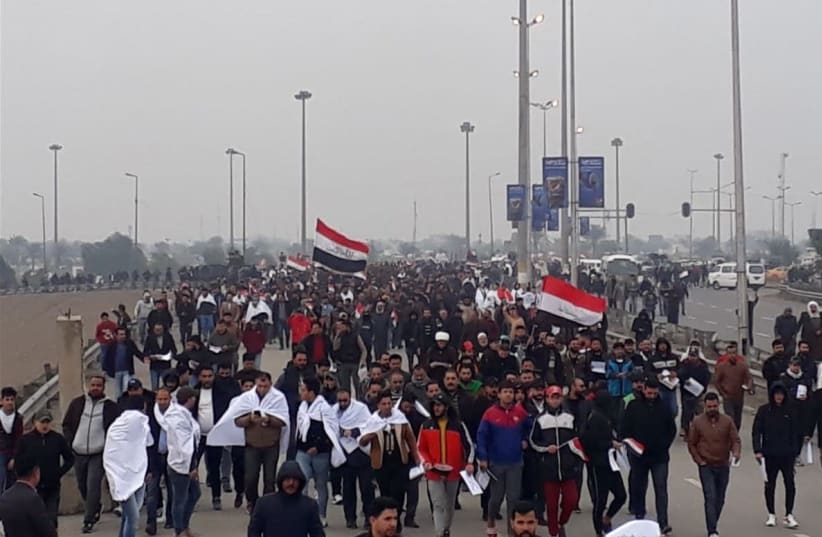The protest was called by Iraqi Shia cleric Muqtada al-Sadr. "The skies, land and sovereignty of Iraq are being violated every day by occupying forces," tweeted Sadr, who called for a "peaceful, unified demonstration to condemn the American presence and its violations."
The initial march appeared not to gather further steam, however, largely dissipating after several hours. Some protesters headed to join separate anti-government demonstrators at Baghdad's Tahrir Square, and others boarded buses to go home.
Throngs of marchers started gathering early on Friday at al-Hurriya Square in central Baghdad and near around the city's main university, Reuters witnesses said. Marchers avoided Tahrir square, symbol of mass protests against Iraq' ruling elites.
The march comes in the aftermath of the US assassination of former IRGC Quds Force commander Qasem Soleimani and deputy of the Popular Moblization Forces (PMF) Shi'ite militia Abu Mahdi al-Muhandis earlier this month in Baghdad.Some were wearing symbolic white robes indicating they're willing to die for their country while others sat looking out over the square from half finished buildings, holding signs reading "No, no, America, no, no, Israel, no, no, colonialists."
It is unclear if the march will end up at the gates of the US Embassy, the seat of US power in Iraq and the scene of violent clashes last month when militia supporters tried to storm the compound.
Main roads in Baghdad were barricaded by security forces and the city's Green Zone, which houses foreign missions, were blocked off with concrete barriers. Outside the US embassy, a sign reads "Warning. Do not cross this barrier, we will use pre-emptive measures against any attempt to cross."
Firas al-Yasser, a member of the political bureau of the Harakat Hezbollah al-Nujaba movement, said that today's rallies marked "a new chapter" in the Iraqi relations with the US, according to Press TV.
"We believe we have reached the zero hour in facing off with the US," said Yasser, calling the Iranian missile attack on US bases in Iraq earlier this month a "prelude" to the expulsion of US forces from Iraq.
Protesters are taking to streets of #Iraqi capital Baghdad on Friday for a million-man rally to call for an end to the military presence of #United_States in their countryhttps://t.co/mx6OEkguBW pic.twitter.com/QYIiczpIOM
— Tasnim News Agency (@Tasnimnews_EN) January 24, 2020
Iraq's parliament passed a resolution earlier this month calling on the government to expel foreign troops from the country. There are about 5,000 troops in Iraq, according to Al-Jazeera. Sadr called the resolution a "weak response" and called for the closure of the US embassy and criminalization of communication with the US government.Pro-Iranian militias in Iraq expressed outrage after Iraqi President Barham Salih met US President Donald Trump on Wednesday at Davos during the economic summit. A spokesman for the Shi'ite Kataib Hezbollah militia, Mohamad Mohie, told Al-Jazeera that Salih has “positioned himself against the Iraqi people.”
Amir al-Kanani, a leader in the Sadrist movement, said that "the call for a march is aimed at all Iraqis in order to increase the pressure on the Iraqi government," according to Al-Jazeera. A spokesman for Kata'ib Hezbollah told Al-Mayadeen that "other means" will be used against US forces if they do not leave Iraq.
Iraq's top Shi'ite Muslim cleric, Grand Ayatollah Ali al-Sistani, later called in his weekly sermon for political groups to form a new government as soon as possible to bring stability to the country and enact reforms to improve Iraqis' lives.
Iraqi anti-government protesters rejected the calls for the million-man march as having nothing to do" with the demands of the demonstrators who have protested against the government for months.
"This million-man march is different from what the street wants. It supports the current political system in the country, it doesn't oppose it," said Abdul Rahman al-Ghazali, a protester at Baghdad's Tahrir Square, a center of the uprising.
Ghazali and other demonstrators said their movement risked being sidelined by the strength in numbers – and weapons – of those marching against the United States.
More than 450 people have been killed as security forces have fired live ammunition, rubber bullets and tear-gas canisters directly at protesters, with battles raging on three bridges over the River Tigris leading to Baghdad's Green Zone.
Friday's march risks clashes between the anti-government protesters and the militia supporters who back the parties that control government and parliament.
Seth J. Frantzman contributed to this report.
